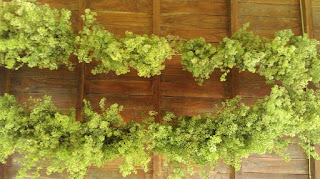Greece
is blessed with an abundance of wild herbs, flowers and plants many
of them indigenous, extremely rare and unique in taste and potency.
There are at least 1800 endemic species and subspecies of plants that
are aromatic and medicinal and at least 300 of these can be used for
various commercial purposes. This means that in recent years there
has been an increased interest in cultivating some of these herbs
organically.
This
richness and diversity of flora is due to the country’s
Mediterranean climate and geological formations (Mountains, gorges,
valleys, rivers and islands). The high quality of herbs is mainly due to the long periods of sunshine and luck of rain! These
conditions oblige the plants to produce big quatinties of essential
oils to survive. Research has shown that the medicinal properties of
the Mediterranean herbs are higher than those growing in other parts
of the world.
 |
| Greek Herbs |
The
names of herbs, their qualities and use have been passed on from
generation to generation as a legacy that blended with mythology,
traditions and home recipes or remedies.
Almost
every place in Greece is known for some particular herbs that are
“magical,” to those less familiar with the healing qualities of
the plants and their fruits.
Each
season of the year has its own herbs. In winter time, as the human
body needs to fight off the cold and humidity, dozens of herbs can
protect the immune system from various infections. Aromatic herbs,
such as Mountain Tea (Sideritis), Tilia, Sage, Chamomile and Thyme, are some
of the most common to find in Greek homes during winter.